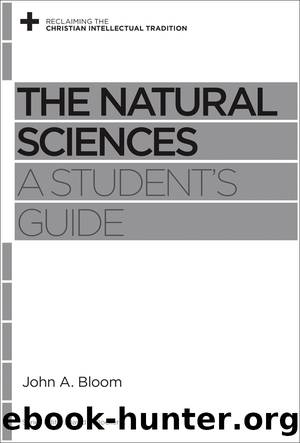The Natural Sciences: A Student's Guide by John A. Bloom

Author:John A. Bloom
Language: eng
Format: epub
Publisher: Crossway
6
BARRICADES
THE END OF THE ROAD FOR REASON AND EXPERIENCE
There are more things in heaven and earth, Horatio, than are dreamt of in your philosophy.
Hamlet, 1.5.166–67
Let’s go back to where our look at the history of science has left us. Fostered in a Christian worldview, the early sciences saw the universe as the handiwork of an ingenious God, who governed his creation through laws that we could discover and understand because we were made in his image. But over time mechanical explanations prevailed, pushing God more and more into the distance until there was no apparent need for him, nor any real sense of his involvement or guidance in the world.
Is this how the story ends? Has science shown us that we are but an accident among the gears of a cold, mechanical, clockwork universe that ticks and grinds along without meaning or significance? Or did we err in thinking that we could remove God from his universe and still be able to make sense of it? There is good reason to think the latter and that the Enlightenment goal of offering a full explanation for the cosmos by referring solely to human reason and experience (known today as methodological naturalism) has failed.
THE LIMITS OF MATHEMATICS
First, there is the problem with human reason itself. Mathematics, seen for millennia as the purest form of logic and the gold standard for truth, turns out to have its limits. One limit was famously proven by Kurt Gödel’s incompleteness theorems, which showed that simple logical principles alone could not prove the internal consistency of any mathematical system. (An example of this is the statement, “This sentence is not provable.”) In addition to this logical consistency problem, the second dilemma is that there’s no reason why mathematics, left to its own devices, so faithfully describes events in the physical world. As famously noted by Eugene Wigner:
The miracle of the appropriateness of the language of mathematics for the formulation of the laws of physics is a wonderful gift which we neither understand nor deserve. We should be grateful for it and hope that it will remain valid in future research and that it will extend, for better or for worse, to our pleasure even though perhaps also to our bafflement, to wide branches of learning.1
This reflection should make us pause. The tool which Galileo saw as the “language of God,” which gave Kepler the insight into God’s thoughts about the riddle of planetary orbits in the solar system, and which Newton developed in order to unlock God’s regular actions, is not as self-evident without God as people thought. To cite Wigner again, “The enormous usefulness of mathematics in the natural sciences is something bordering on the mysterious and . . . there is no rational explanation for it.”2
If the correspondence of mathematics with reality has no rational explanation, then what can we say about physics and the other sciences? No one doubts that the equations work, but why do they work? And why can we figure them
Download
This site does not store any files on its server. We only index and link to content provided by other sites. Please contact the content providers to delete copyright contents if any and email us, we'll remove relevant links or contents immediately.
The Lost Art of Listening by Michael P. Nichols(6462)
Why I Am Not A Calvinist by Dr. Peter S. Ruckman(3766)
The Rosicrucians by Christopher McIntosh(3046)
Wicca: a guide for the solitary practitioner by Scott Cunningham(2702)
Signature in the Cell: DNA and the Evidence for Intelligent Design by Stephen C. Meyer(2495)
Real Sex by Lauren F. Winner(2466)
The Holy Spirit by Billy Graham(2408)
To Light a Sacred Flame by Silver RavenWolf(2350)
The End of Faith by Sam Harris(2279)
The Gnostic Gospels by Pagels Elaine(2023)
Nine Parts of Desire by Geraldine Brooks(2002)
Waking Up by Sam Harris(1953)
Heavens on Earth by Michael Shermer(1950)
Devil, The by Almond Philip C(1896)
Jesus by Paul Johnson(1882)
The God delusion by Richard Dawkins(1843)
Kundalini by Gopi Krishna(1821)
Chosen by God by R. C. Sproul(1754)
The Nature of Consciousness by Rupert Spira(1687)
